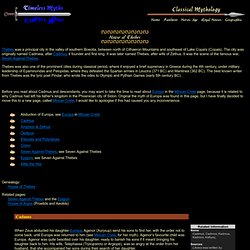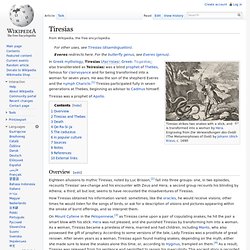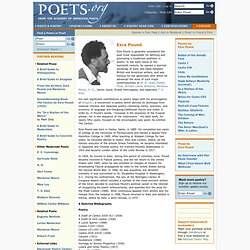

House of Thebes. Laïus (Laius or Laios; Λάιος) became king of Thebes, after the death of Amphion and Zethus.

He married Jocasta (Ἰοκάστη; some authors call her Epicasta), daughter of Menoeceus and sister of Creon. Laius had at one time visited Pelops, king of Pisa, as a guest. Pelops had an illegitmate son, named Chrysippus, by a nymph named Astyoche or Axioche. Because of Chrysippus' beauty, Laius fell in love with the youth. When Laius was training Chrysippus in driving the chariot, he abducted the boy and raped him. When a son Oedipus (Oidipous; Οἰδίπους) was born to the royal couple, Laïus learned from the oracle that his son will one day kill him and have children by his mother. When Oedipus grew to manhood, however, he had also learned from the oracle in Delphi, that he would kill his father and marry his mother.
As he travelled, he encountered Laïus in his chariot with his armed escorts on their way to Delphi. They were happily married and over the years Thebes prospered under Oedipus' reign. Tiresias. Tiresias. Tiresias strikes two snakes with a stick, and is transformed into a woman by Hera.

Engraving from Die Verwandlungen des Ovidii (The Metamorphoses of Ovid) by Johann Ulrich Kraus, c. 1690 Tiresias was a prophet of Apollo. Overview[edit] Eighteen allusions to mythic Tiresias, noted by Luc Brisson,[2] fall into three groups: one, in two episodes, recounts Tiresias' sex-change and his encounter with Zeus and Hera; a second group recounts his blinding by Athena; a third, all but lost, seems to have recounted the misadventures of Tiresias. How Tiresias obtained his information varied: sometimes, like the oracles, he would receive visions; other times he would listen for the songs of birds, or ask for a description of visions and pictures appearing within the smoke of burnt offerings, and so interpret them. He is said to have understood the language of birds and could divine the future from indications in fire, or smoke.
Tiresias and Thebes[edit] Death[edit] Qe-Ra-Si-Ja[edit] The caduceus[edit] Eliotswasteland.tripod.com/notes.html#f218. Ezra Pound. Ezra Pound is generally considered the poet most responsible for defining and promoting a modernist aesthetic in poetry.

In the early teens of the twentieth century, he opened a seminal exchange of work and ideas between British and American writers, and was famous for the generosity with which he advanced the work of such major contemporaries as W. B. Yeats, Robert Frost, William Carlos Williams, Marianne Moore, H. D., James Joyce, Ernest Hemingway, and especially T. S. His own significant contributions to poetry begin with his promulgation of Imagism, a movement in poetry which derived its technique from classical Chinese and Japanese poetry—stressing clarity, precision, and economy of language and foregoing traditional rhyme and meter in order to, in Pound's words, "compose in the sequence of the musical phrase, not in the sequence of the metronome. " Ezra Pound was born in Hailey, Idaho, in 1885. A Selected Bibliography Poetry Prose Anthology Multimedia.